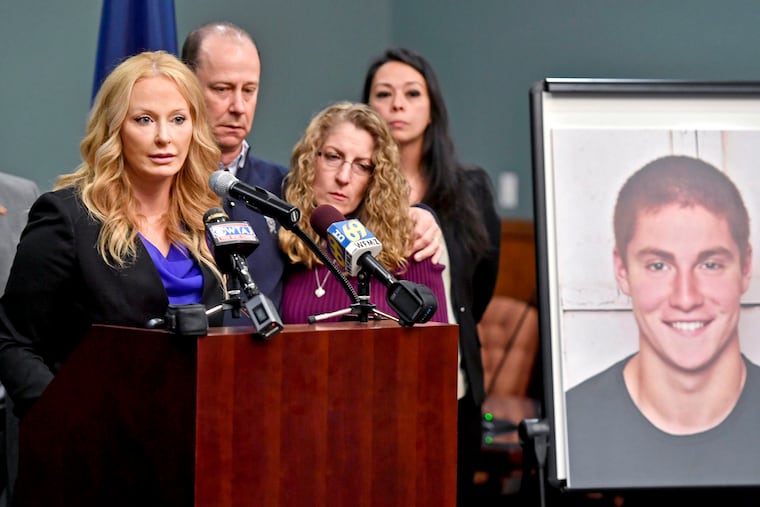Two former PSU frat brothers enter guilty pleas in fraternity hazing incident in which Tim Piazza was fatally injured
Brendan Young and Daniel Casey pled guilty to hazing and reckless endangerment.

Two former Pennsylvania State University fraternity members involved in a 2017 fraternity hazing case in which student Tim Piazza died have entered guilty pleas, bringing closure to a case that has dragged on for more than seven years, Pennsylvania’s attorney general announced Tuesday.
Brendan Young, who had been president of the Beta Theta Pi fraternity, and Daniel Casey, who had been vice president and pledge master, have pleaded guilty to 14 counts of hazing and one count of reckless endangerment — all misdemeanors, according to the office of Attorney General Michelle Henry.
Young, 28, who had been from Malvern at the time, and Casey, 27, who had been from Ronkonkoma, N.Y., “participated in and facilitated the hazing event,” the attorney general’s office said.
» READ MORE: Penn State frat death raises questions for grieving parents
The case drew national attention as video surveillance from the fraternity house on the night Piazza was fatally injured was played in court, showing Piazza, who was from Hunterdon County, N.J., and others moving through a drinking obstacle course and chugging alcohol. The video also showed Piazza in the early morning staggering and falling in the fraternity house, dropping to his knees, and clutching his injured head, and no one helping him.
Casey and Young are due to be sentenced Oct. 1. Jim and Evelyn Piazza, Tim Piazza’s parents, will appear in court to provide their victim impact statements, said their attorney Thomas R. Kline.
“I’m relieved that this matter has been settled and that they have admitted to both hazing and recklessly endangering our son,” Jim Piazza said. “And while that doesn’t do anything to bring him back, it’s certainly great to have this behind us.”
Penn State in a statement said: “We are relieved that justice has been served, and the university continues to mourn Timothy Piazza’s tragic death.”
The university also noted that it had permanently banned Beta Theta Pi from ever returning to campus and called the hazing activities addressed in the criminal cases “heart-wrenching and incomprehensible.”
“The university strongly condemns any form of hazing, which endangers the well-being and safety of others,” the school said.
Attempts to reach attorneys representing Casey and Young were unsuccessful.
About two dozen former Beta Theta Pi members previously entered pleas to charges including hazing, conspiracy to commit hazing, and furnishing alcohol to minors.
» READ MORE: Students charged with manslaughter in Penn State frat death
Young’s and Casey’s were the final two cases to be resolved, according to the attorney general’s office. The case took so long in large part because of appeals to pre-trial court rulings, the attorney general’s office said.
“There should be no discussion of this case without recognizing the tragic loss of life and resulting devastation for Mr. Piazza’s family and friends,” Henry said in a statement. “Mr. Piazza was simply seeking to join a social organization for the benefits of community and shared experiences, as so many university students do. Most of those students go on to successful lives and careers ... which Mr. Piazza never had the opportunity to experience.”
In February 2017, Piazza, then a sophomore engineering major from New Jersey, drank copious amounts of alcohol at a pledge party as part of a hazing ritual and later fell down a flight of stairs. No one called for help for nearly 12 hours, and Piazza later died.
Dozens of fraternity members were charged in his death, though some of the most serious charges, including involuntary manslaughter and aggravated assault, were thrown out in Centre County Court.
Penn State cracked down after Piazza’s death, suspending several groups and instituting new restrictions on Greek life. The Pennsylvania legislature subsequently passed the Timothy Piazza Anti–Hazing Law, which toughens penalties for hazing that results in serious injury or death.
The Piazzas in 2019 filed a wrongful death suit against 28 former members of the fraternity. That case continues. They had reached a settlement with Penn State without filing a lawsuit.
“The conclusion of the criminal proceedings now removes the most significant impediment in moving the civil claim against Young, Casey and other defendants to trial in federal court...,” Kline said.
Kline noted the significance of the reckless endangerment plea. That plea applies to Piazza, the attorney general’s office said. The hazing counts are for each pledge member who was subject to the drinking obstacle course.
Penn State did not immediately respond to a request for comment.